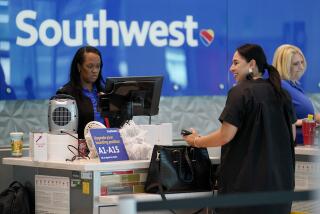Going Somewhere? Which Trip Costs May Be Tax-Deductible
- Share via
Tax accountant Ralph Anderson has some seasonal tax-planning advice for all of you who have at least some self-employment income: Write off your summer vacation.
Well, OK, that’s an overstatement. But experts agree that if you couple business with leisure, at least a portion of any trip (it need not be in summer, of course) can be deducted.
Although travel expenses can sometimes be deducted by employees as well as by business owners and the self-employed, the deductions are usually most lucrative for people who work for themselves.
Why is that? To claim a tax deduction for unreimbursed (remember that word) business expenses, employees must leap over a deduction “floor.” Their business expenses are lumped together with “miscellaneous itemized deductions,” which can be deducted from their taxes only to the extent that these expenses exceed 2% of their adjusted gross income.
Meaning, if your adjusted gross income is $50,000 and you have $1,000 in unreimbursed business expenses and other miscellaneous itemized deductions, you’d get no tax break, because the expenditures don’t exceed that 2% floor. If you have $1,050 in such expenses, $50 is deductible--that’s the amount that exceeds 2% of your AGI.
Now for the “unreimbursed” part: As an employee, you can claim only the portion of your expenses that your employer will not reimburse. Unless your employer has a policy of not reimbursing any expense no matter how legitimate, it’s tough to justify a write-off. After all, why would the IRS second-guess your company if your employer believes these expenses aren’t valid enough to warrant reimbursement?
But if you are self-employed or a company owner, you have no itemized-deduction floor. Your business expenses are subtracted dollar-for-dollar from your business income on Schedule C.
What’s more, it’s pretty much up to you to decide what’s legitimate and what’s not. Though the IRS will disallow your deductions (labeling them hobby expenses) if you lose money at your trade or business for several years running, as long as you earn a profit and you have a reasonable argument about why the expenses were necessary, they’re generally allowed.
Here are some other things you should keep in mind before you try deducting your vacation expenses:
* Keep good records. It’s up to you to establish that the primary purpose of your trip was business, not pleasure. To do that, you need records--ideally a log or calendar that establishes what you were doing each day and how that improved your ability to generate income. You do not need to share these records with the Internal Revenue Service unless you are audited. Needless to say, if you do get audited, they’ll be invaluable.
* Only the business portion is deductible. Let’s say you rent a beach house each summer and invite clients to stay on weekends. Given what you do for a living, you have reason to believe that these weekends build up goodwill for your company and thus lead to more sales and better income in the long run.
However, if you and your family are also staying at the house, you must separate the personal expenses from the business ones, says Anderson, who is co-chairman of the tax department at Richard A. Eisner & Co., an accounting and consulting firm in New York.
Likewise, if you have a business trip and decide to turn it into a long weekend away with the family, you can deduct the cost of your plane ticket and the hotel room for the night or nights you must stay to attend meetings or other business activities. You need not worry about the fact that your spouse and kids are in the room with you. You cannot, however, deduct the cost of their travel, nor can you deduct the cost of extra hotel nights not related to the business purpose of your trip.
An exception can be made if you can establish that you stayed those extra nights to get a better rate on your air fare. However, the air fare savings should be at least as much--and preferably more--than the additional amount you spent on the hotel.
* Whole trips are deductible as long as they are “ordinary and necessary” and the primary purpose of them is to improve your business or investment performance.
You may have to fight with the IRS a bit, but if you can establish that your whole trip to Europe or Hawaii was undertaken to improve your ability to earn money at your current profession, you’re likely to win in the end, says Philip J. Holthouse, partner at the Los Angeles tax law and accounting firm of Holthouse Carlin & Van Trigt.
There are no “bright line” rules that say unequivocally which trips are and are not deductible, Holthouse adds. However, the IRS usually looks at how much time you spend on business versus pleasure. If the business hours add up to less than half the trip, or if the trip does not have a direct relationship to what you now do for a living, you’re headed for trouble.
* Trips to check on your investments can also be deductible, if the trips are reasonable and necessary, but the amount you deduct ought to be proportionate to the amount of income you’re likely to generate from having taken the trip.
For instance, you can deduct expenses to travel to your out-of-state rental property if you’re going there to handle maintenance, legal issues or another matter necessary to continue renting out the unit or units. But the IRS would probably disallow deductions for a trip to Hawaii if the investment it related to was a relatively small stock portfolio and you spent a few hours--or even a few hours each day--in seminars about how to handle such investments. It’s likely to be a different story if you spent eight hours each day attending investment seminars, hitting the beach only in the late afternoons, and the portfolio the classes related to was substantial--say $500,000 or $5 million.
* Meal and entertainment expenses are 50% deductible as long as you can establish that you discussed business during the golf game or the meal.
*
Times staff writer Kathy M. Kristof welcomes your comments but cannot respond individually to letters or phone calls. Write to Personal Finance, Business Section, Los Angeles Times, Times Mirror Square, Los Angeles, CA 90053, or e-mail kathy.kristof@latimes.com.
More to Read
Inside the business of entertainment
The Wide Shot brings you news, analysis and insights on everything from streaming wars to production — and what it all means for the future.
You may occasionally receive promotional content from the Los Angeles Times.










